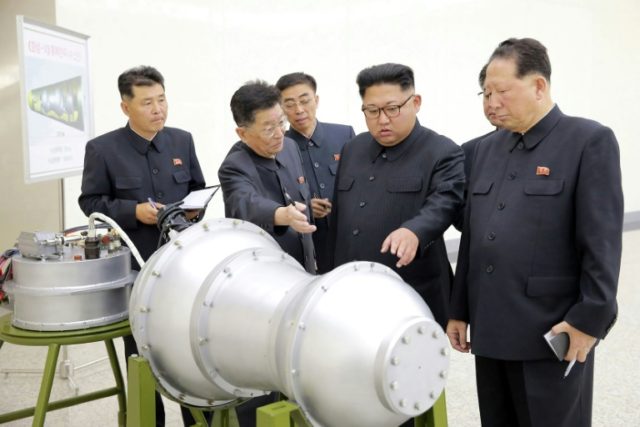State Department spokeswoman Heather Nauert told reporters Thursday that America’s stance on negotiations with North Korea has not changed regarding denuclearization and that Washington would take no “corresponding measures” to please Pyongyang before the communist rogue state fully dismantles its illegal nuclear program.
Nauert was responding to a question about a provision in the “September Pyongyang Declaration,” signed this week by South Korean President Moon Jae-in and North Korean dictator Kim Jong-un, that stated the North would dismantle its Yongbyon Nuclear Scientific Research Center in exchange for unspecified “corresponding measures” from the White House. Kim also “agreed to permanently shut down its Dongchang-ri missile engine testing facility and missile launch pad under the participation of experts from related countries” and allegedly allowed for international inspections.
Yongbyon reportedly houses at least one nuclear reactor and equipment to enrich uranium and develop other radioactive materials. It is not a test site and does not produce missiles.
The response came during a regular press briefing at the State Department.
“I think I’d just go back to what I’ve said about that very issue before, and that nothing can happen in the absence of denuclearization. Denuclearization has to come first, okay,” Nauert said in response to the Pyongyang Declaration statement.
Nauert added that, despite the meeting between Kim and Moon only yielding this provisional promise for denuclearization in exchange for concessions from Washington, “any time that we have our government sitting down and talking with their government, that we have President Moon talking with chairman Kim, it is a step in the right direction.”
She noted that, as the State Department predicted, meetings such as the one between the two leaders this week “will become regular, where it’s not such a surprise when the U.S. is having conversations, trading emails, phone calls, whatever you want to call it.”
Moon flew into Pyongyang Tuesday for a series of meetings with Kim, resulting in the publication of the joint declaration. Upon his return to Seoul, Moon told reporters he was now optimistic that the two Koreas could, by the end of the year, find a way to formally end the Korean War, which began in 1950 and technically continues to this day. A formal peace treaty to end the Korean War would require participation from two other warring parties, China and the United States. Moon is scheduled to land in New York on Monday to meet President Donald Trump and brief him on his talks with Kim, in addition to addressing the United Nations General Assembly.
In her press briefing Thursday, Nauert said President Trump expects first and foremost to “get a very fulsome readout that resulted from the meeting between North Korea and South Korea.” Secretary of State Mike Pompeo will also be privy to those conversations, and Nauert reaffirmed that the State Department hopes to complete the dismantlement of the illegal North Korean nuclear program by 2021.
Nauert added that the presence of inspectors from the International Atomic Energy Agency (IAEA), the world body governing nuclear proliferation, was “normal course of doing business” and a “shared understanding” she believes Washington and Pyongyang both have regarding how denuclearization would occur.
The Pyongyang Declaration does not identify the IAEA but does note that Kim would be open to “international” inspections.
Conservatives in South Korea were underwhelmed by Moon’s presence in Pyongyang, which included performances by pop acts, gymnastics troupes, and throngs of forcibly adoring North Korean citizen-captives. Chosun Ilbo, a conservative South Korean newspaper, initially described the results as “little of substance.” On Thursday, the newspaper reported that the country’s national security adviser, Chung Eui-yong, “tried to dispel the impression that the latest inter-Korean summit produced little but hot air.”
“Broad discussions were held in addition to what was included in the joint declaration,” Chung said, repeating claims that Moon has a private message from Kim to Trump that he will deliver next week and that not all of the agreements made are public yet.
South Korea’s JoongAng Ilbo details that Moon will be in the United States for five days next week, where he will hold “in-depth discussions on practical measures to achieve a breakthrough in the North-U.S. dialogue for the denuclearization of the Korean Peninsula and advance inter-Korean and North-U.S. relations in a virtuous cycle.”

COMMENTS
Please let us know if you're having issues with commenting.